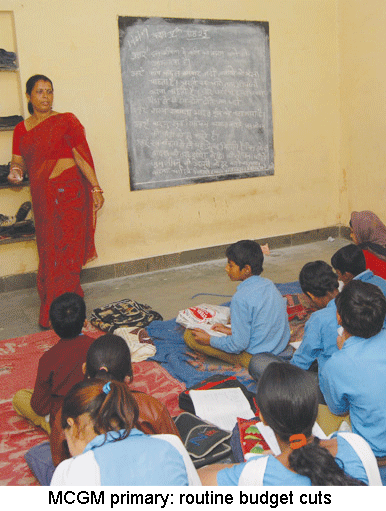 Friends-turned-foes — the shiv Sena and Bharatiya Janata Party (BJP) — are likely to become friends again to rule Mumbai, the country’s commercial capital. In the local election to elect corporators to the Municipal Corporation of Greater Mumbai (MCGM) — the country’s richest municipal government which has an annual budget of Rs.37,052 crore (2016-17) — held on February 21, the Sena won 84 seats closely followed by BJP (82), both short of the magic 114 seats required for an absolute majority. The Congress which has won 31 seats hates the BJP and Shiv Sena with equal vehemence and vice versa. Therefore, a remarriage of the BJP-Shiv Sena which has ruled MCGM since 1997 is very much on the cards.
Friends-turned-foes — the shiv Sena and Bharatiya Janata Party (BJP) — are likely to become friends again to rule Mumbai, the country’s commercial capital. In the local election to elect corporators to the Municipal Corporation of Greater Mumbai (MCGM) — the country’s richest municipal government which has an annual budget of Rs.37,052 crore (2016-17) — held on February 21, the Sena won 84 seats closely followed by BJP (82), both short of the magic 114 seats required for an absolute majority. The Congress which has won 31 seats hates the BJP and Shiv Sena with equal vehemence and vice versa. Therefore, a remarriage of the BJP-Shiv Sena which has ruled MCGM since 1997 is very much on the cards.
However, irrespective of the party or alliance that rules MCGM, not much is likely to change for the 383,485 students in municipal schools whose education has never been of much concern to civic governments. Although the pre-election manifestos of the Sena and BJP promised vastly improved infrastructure and quality education for the 1,230 municipal schools, a study of MCGM’s annual education expenditure during the past five years (2012-17) indicates it spent less than 45 percent of the budgeted amounts.
Of the 1,230 schools owned and/or managed by MCGM, 1,082 are primaries (classes I-VIII) and 148 are secondary (class IX-X) institutions. During the election campaign, Shiv Sena candidates highlighted the party’s education initiatives as its great achievement — especially its digital initiative of providing 22,799 computer tablets to class VIII students, establishing 480 virtual classrooms and setting up 200 computer laboratories. However, education activists in the metropolis point out that most of these initiatives are yet to take off due to implementation bottlenecks. For instance, the tablets have been lying unused due to lack of electrical charging points in MCGM schools, while the hardware for computer laboratories announced in the 2015-16 and 2016-17 budgets is still at the tendering stage.
“The Right of Children to Free & Compulsory Education (RTE) Act, 2009, clearly requires all schools to meet certain infrastructure, teaching, administrative and supervisory norms within three years of the Act coming into force on April 1, 2010. But in the absence of accountability, none of these norms have been fully met in MCGM schools. Municipal officials are complacent because timely and effectual supervision is rare. When issues are raised, everyone indulges in the blame game,” says Nilendu Kumar, development officer, western region, Child Rights and You, the well-known NGO.
Clearly, lack of money for education isn’t a constraint. The cash-rich MCGM’s budgeted amount per student in 2016-17 was Rs.59,115 — perhaps the highest local government allocation countrywide. However, over the years, utilisation of budgeted funds has been dipping. According to The State of Municipal Education in Mumbai released in December 2016 by the Praja Foundation, a voluntary organisation which provides information on civic issues, of the Rs.2,630 crore budget for 2015-16, only 68 percent (Rs.1,779 crore) was utilised whereas in the previous year 73 percent was utilised. It’s hardly a secret in Mumbai that MCGM routinely utilises only 60 percent of its budgeted amount because the corporation’s high establishment and revenue expenditure consume most of MCGM’s revenue.
Consequently, with only half the amounts budgeted for education being actually spent on MCGM’s primary and secondary schools, lack of infrastructure and poor quality education are forcing parents to sign up their children in fees-levying private schools. The Praja Foundation, a voluntary organisation which tracks MCGM’s expenditure, has been consistently warning of the exodus from the corporation’s schools. Latest information obtained by the foundation under the Right to Information Act, 2005 indicates that a mere 34,549 children were enrolled in class I in 1,082 MCGM schools in 2015-16.
Now with the BJP-Shiv Sena alliance having ruled Mumbai for the past 20 years and about to take charge of MCGM again, the charade of big budgets but little expenditure on primary education is set to be re-enacted even as the municipal schools of India’s commercial capital go from bad to worse.
Dipta Joshi (Mumbai)